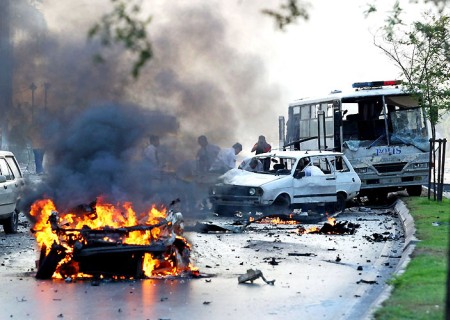The Turkish-Kurdish conflict
Kurdish representative:
The Kurdish organization Koerdische Jongeren en Studenten Unie (KJSU)
Represented by S. Sinjarim, Secretary of the KJSU
Turkish representative:
The Turkish organization Turkish-Dutch Student association Erkin
Represented by Armand Sağ, Chairman of the TDSA Erkin and also a student at the Utrecht University, having a BA Turkish History
From the answers the Kurdish representative gave are these the conclusions
In the beginning he claims he’s a Kurd and that he’s from Kurdistan, as if it is a legitimate nation. Moreover he talks about the “existence of the Kurdish state” and claims it to be a area without an owner, but when he described the Turkish people the Kurdish area does belong to Turkey. He states that the Kurdish people “embrace peace” and that the Turkish people “exclude peace in the own country”.
Than in his answer about how he thinks about the situation in Turkey he puts himself outside Turkey, also referring to the Turks as ‘they’. When he talks about the Kurdish people he sometimes refers to them in a passive and sometimes in a active way . It changes within the answers. He is very emotional at times “we have been through enough” which indicates that he feels very much connected with the Kurdish people in Turkey, even threatening the reader in his sentence “Kurdish people will go on until they get what belongs to them”, maybe that’s due to the strong feeling of nationalism promoted among the Kurds
He also shows that he’s not a supporter of the PKK because it uses violence, but that he does have the same aims as the PKK. Furthermore he is very convinced of the Kurdish strength when talking about having the whole world supporting the Kurdish. He mocks Erdogan by saying he invaded Kurdistan for his own profit and is just killing without a higher reason like the Kurds. He’s convinced that the Kurdish people will have their own country because they are strong enough to withstand everything.
From the answers the Turkish representative gave we can conclude this
The answers the Turkish interviewee gave are very comprehensive and contain a lot of facts, and less personal meaning. Therefore it’s harder to draw his point of view of the conflict. Because of his BA in Turkish history he has a lot more knowledge than a random person. What can be said about his personal point of view is that he doesn’t really think that the situation is as serious as the media make it seem. He convincingly showed that the number of Kurds is very small, and that the Kurdish people don’t have a majority anywhere, even in the areas they proclaimed so that the problem is overrated and that it’s the PKK is to be blamed for. He does call the PKK a terrorist group, like the Western world has labeled it. Although the PKK is displayed as the Kurdish representative in the media, he is not impressed by the PKK because of their small number of members.
When asking him about his involvement in the conflict he doesn’t really refer to one point in history but looks at it as a continuing process. He compares it with him sometimes experiencing problems with Dutch people on the street. He doesn’t seem to be touched by the conflict, despite giving notion of the death of his nephew. He talks rather easily about it and doesn’t show very much emotions. This may be due his academic background, he puts himself in the role of the storyteller.
Furthermore he seems to have sympathy for the Kurds, and is not afraid to show it. He states that the Turks and the Kurds have mixed and that every Turk has at least someone in the family with Kurdish blood. Therefore feelings of hostility against the Kurds can’t be traced in his answers.
Comparing the two
The Kurdish interviewee seems to be a lot more emotional about the situation. His background is unknown to the interviewers, but he has access to information. Although he is living in the Netherlands he feels a very strong connection with his countrymen, at least, he shows it more bringing about more emotive arguments. Unlike the Turkish interviewee who looks at it from a distance and brings about more factious arguments and showing less emotions. Therefore it can be concluded that in this interview both interviewees have enough access to information about the conflict but that the Kurdish one has a stronger sense of nationalism and the Turkish one doesn’t have so much a Turkish feeling of separate national identity but of the two people together.
Armand Sağ
February 1, 2008
© Armand Sağ 2008
|

